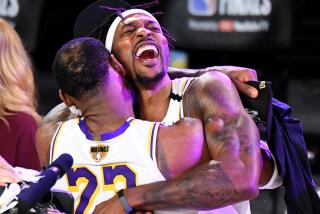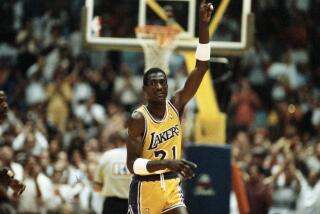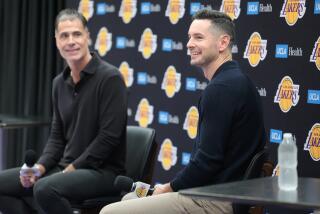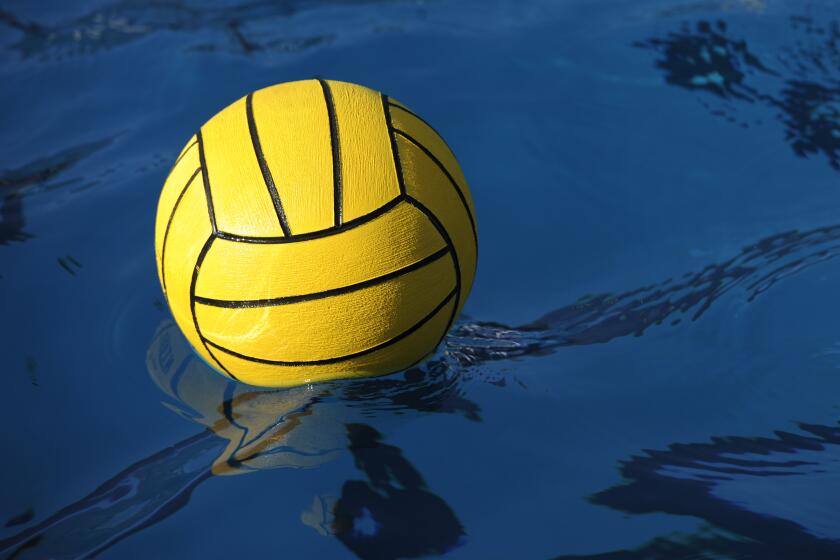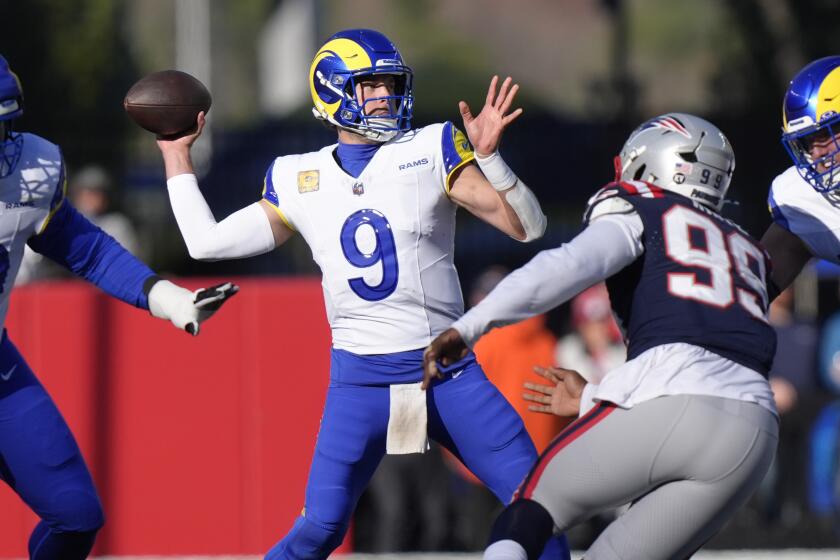Kareem Abdul-Jabbar knows what Lakers’ Dwight Howard is going through
Their stories are eerily similar, even if there is a gap of 37 years between them.
Each was the NBA’s dominant center and each demanded to be traded. Both stars ended up with the Lakers and their deals sent shock waves across the league.
Kareem Abdul-Jabbar was 28 when he was traded by the Milwaukee Bucks to the Lakers in 1975 as part of a six-player deal, while Dwight Howard, 26, arrived Friday as part of a four-team, 12-player trade that also sent Andrew Bynum to the Philadelphia 76ers.
PHOTOS: Dwight Howard’s Magic days
Abdul-Jabbar won five of his six NBA titles with the Lakers and then spent several years as a special assistant coach working with Bynum.
In a wide-ranging interview with The Times, Abdul-Jabbar shared his thoughts about the Howard trade, the pressure on the Lakers to win another title and how he ranks among the team’s all-time centers.
“The Lakers did a great job this off-season improving the team, Dwight being the latest,” Abdul-Jabbar said. “Getting Steve Nash was a big deal. He’s one of the best players in the league at his position. In addition, they replaced Andrew with Dwight Howard and that was nothing short of a coup.
“They’ve done a great job and managed to keep Pau [Gasol]. It will make for a formidable team.”
As talented as the Lakers’ roster is, he said, several things must happen to ensure a championship season.
“Giving the personalities a chance to mesh” is critical, Abdul-Jabbar said. “Everyone understands the game, especially Pau, Nash, Kobe [Bryant] and Metta [World Peace]. They all have great basketball IQ. It’s not about them being knowledgeable. You just have to mesh their personalities and playing styles together in a smooth way.”
Howard joins a lengthy list of celebrated Lakers centers: George Mikan, Wilt Chamberlain, Abdul-Jabbar and Shaquille O’Neal. Howard has career averages of 18.4 points, 13 rebounds, 2.2 blocks and has won the NBA’s defensive player of the year award in three of the last four seasons.
“I don’t know if he needs to change his game that much,” Abdul-Jabbar said. “He just needs to show up and give what he normally does. He’s a beast on the boards. He plays on both ends of the floor. And he provides post-up points.”
Abdul-Jabbar likes Howard’s energy on the court.
“Dwight is very committed to playing and winning,” Abdul-Jabbar said. “Andrew has been up and down on that issue. There are times he wants to play, do a great job and he goes out and does it. Then there are other times where it seems like he’s not focused.”
Bynum was benched during a game last season for launching an ill-advised three-pointer and was fined by the team for his conduct. He was also ejected from two games in a two-week span and he sometimes acknowledged lacking effort. Those incidents soured an otherwise breakout season. Bynum posted career highs in points (18.7) and rebounds (11.8) and made his first All-Star team.
Abdul-Jabbar said he saw Bynum’s focus wane when he worked with him from 2005 to 2009. He said his coaching duties were significantly scaled back in the 2008-09 season after Bynum expressed a lack of interest to the Lakers’ staff in working with Abdul-Jabbar.
“When I first started working with him, he was eager to learn,” Abdul-Jabbar said. “He appreciated me shortening the learning curve. Once he figured he did everything he wanted to do in terms of learning, he didn’t want me to bother him constantly going over the fundamentals.”
Abdul-Jabbar said he was unsure if Bynum would thrive in a larger role in Philadelphia: “It’s up to him to determine how much of a leader he wants to be and how to make that happen on the court. Some people like that position and adjust to it naturally. Other people aren’t comfortable with it.”
Abdul-Jabbar relates to Howard’s situation because both asked to be traded.
Although Abdul-Jabbar had won a championship with Milwaukee, he believed that Oscar Robertson’s retirement in 1974 significantly hurt the team’s chances of winning another title. So he asked the front office to trade him to either the New York Knicks or the Lakers.
Milwaukee owner Wes Pavalon and he stayed quiet about the trade request for eight months until the Bucks traded Abdul-Jabbar to the Lakers in June 1975. “He understood I wanted to leave and didn’t make it difficult,” Abdul-Jabbar said of Pavalon. “He just wanted some time to make the best thing he could for the franchise.”
Despite winning his fourth MVP award in his first season with the Lakers, Abdul-Jabbar didn’t win a title in L.A. until Magic Johnson’s rookie season in 1979-80.
Mikan, Chamberlain and O’Neal all won championships with the Lakers. How does Abdul-Jabbar rank himself with those legends?
“Mikan was all about scoring and rebounding. When Wilt got to the Lakers, he was a defensive player, mainly. He didn’t have his great offensive years here as he did earlier in his career. When I got with the team, I was playing both ends of the court. I scored a lot, rebounded and blocked shots,” Abdul-Jabbar said.
“When we got the right pieces with Jamaal [Wilkes], Magic [Johnson] and Norm Nixon, things really fell into place and we were able to win consistently and be contenders. Shaq’s teams were great with him and Kobe. They had great balance in scoring and Shaq gave them an inside threat.”
Now the pressure is on Howard and Nash to add to the team’s collection of titles.
“Just the addition of those guys makes them contenders,” Abdul-Jabbar said. “I’m not going to predict they’ll win it all. But the proof is in the pudding. They put the pieces in that place to make it happen.”
Medina is a Times correspondent.
twitter.com/MarkGMedina
More to Read
Go beyond the scoreboard
Get the latest on L.A.'s teams in the daily Sports Report newsletter.
You may occasionally receive promotional content from the Los Angeles Times.
